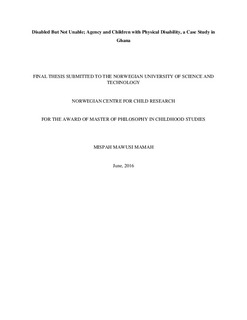Disabled but not unable : agancy and children with physical disability : a case study in Ghana
Master thesis
Permanent lenke
http://hdl.handle.net/11250/2401974Utgivelsesdato
2016Metadata
Vis full innførselSamlinger
Sammendrag
Children with disabilities in most Ghanaian societies are considered burdens, victims of circumstances, who deserve nothing but pity. Coupled with this is the long standing cultural construction of disability as a punishment from the gods. Consequently children with disabilities are mostly excluded from the mainstream society and are denied opportunities to explore their abilities, skills and potentials. Many studies in the field of disability have focused mainly on the disturbing situations of children with disabilities. This study sought to explore agency of children with physical disability by looking at how they navigate their experiences of disability amidst restrictions and complexities of disability in their everyday lives. The study further explored the children’s perspective of their disability. The study was conducted in the context of two regular schools in Ghana. Children with physical disability, most of whom have mobility difficulties formed the main informants. The general methodological approach employed was qualitative. Methods used include individual interview, diary and participant observation. The study was informed by the perspectives of the Sociology of childhood.
The findings in this study suggest that the children’s perception about the causes of their disability could to some extent shape how they navigate experiences of disability. The study also reveals that the children employed overlapping perspectives; the medical model of disability and social model of disability in constructing their disability. Whiles alluding to the fact that their body’s malfunction place limitation on their abilities in some ways, they also believe that failure of the society to give consideration to their condition is disabling. The study further suggests that children with physical disabilities are social agents who exercise their agency in myriads ways. Nevertheless factors such as poverty, discrimination, absence of proper structures constrain how the children negotiate their agency.
